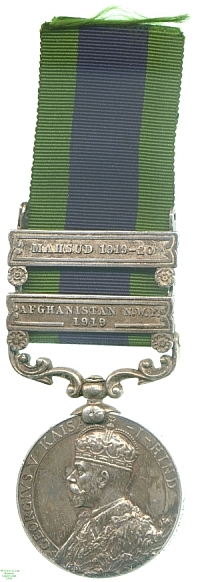
Obverse, a portrait of King George V in robes

Reverse, Jamrud fort overlooking Khyber Pass with mountains behind

Obverse, a portrait of King George V in robes |

Reverse, Jamrud fort overlooking Khyber Pass with mountains behind |
The India Medal of 1895 having needed alteration for its last issues due to the death of Queen Victoria, in 1908 it was decided to replace it entirely with a new medal of Edward VII, which was first issued in 1909. When the first issue was made under King George V, in 1911, Richard Garbe designed a new obverse but the medal was otherwise unaltered.
Afghanistan, though outside the British Empire, had remained under close British attention due to its pivotal position between Russia and British India, resulting in the series of political plays which Kipling immortalised as "The Great Game". When Amanullah Khan seized control of the state after the unexpected murder of his father Habibullah Khan in 1919, he was well positioned to take advantage of a recent deterioration in these relations due to the Russian Revolution of 1917. He declared formal Afghan independence and repudiated previous treaties. His early successes in expelling British forces from his borders led to a retaliation in force, including the bombing of his capital by the RAF, which was a key factor in forcing an Afghan surrender later in 1919.
The ignominious defeat of Afghan forces in this campaign left considerable dissatisfaction among the border tribesmen, resulting in persistent raiding, and various British punitive expeditions included one against the Mahsud tribe of what was by then independent Waziristan (which spent part of 2006 again independent in defiance of Pakistani claims) in the winter of 1919-1920.
Seemingly present in both the Afghan and Mahsud campaigns was Private Chowrimuthoo of the 1st Battalion, 61st Pioneers, whose medal this is. A further bar was awarded for campaigns in Waziristan 1919-1921, and since the Mahsud tribe lived and live in central Waziristan, it is very unusual to find the Mahsud bar without the Waziristan one; it is not impossible that this bar was at some point in the medal's history removed to increase its value. This must have been done very early if so, however, since Lester Watson purchased the medal, issued in 1921, from the London dealers Baldwin before 1928.